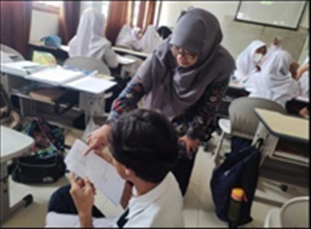Pendampingan Penyusunan Perangkat Pembelajaran Berbasis Problem Based Learning untuk Meningkatkan Komunikasi Matematika Siswa Assistance in the Preparation of Problem-Based Learning Tools to Improve Students' Mathematical Communication
Main Article Content
Abstract
This community service activity aims to assist mathematics teachers in the preparation of Problem Based Learning (PBL)-based learning tools and implementation in order to improve students' mathematics communication at SMP Muhammadiyah Surakarta Special Program. PBL is a learning model that emphasizes the solving of real problems and the use of mathematics in everyday contexts. This activity began with the identification of problems in the mathematics learning process at SMP Muhammadiyah Surakarta Special Program. The team provided assistance to mathematics teachers in designing the preparation of RPP and LKPD. After the learning tools have been compiled, then a discussion that examines the learning tools is produced. This community service activity has an impact on improving students' mathematics communication at SMP Muhammadiyah through a PBL-based learning approach. By applying relevant learning tools and involving students in solving real problems, there is an increase in mathematics communication of students of SMP Muhammadiyah PK Surakarta.
Downloads
Article Details

This work is licensed under a Creative Commons Attribution-ShareAlike 4.0 International License.
Authors who publish with this journal agree to the following terms:
- Any article on the copyright is retained by the author(s).
- Author grant the journal, right of first publication with the work simultaneously licensed under a Creative Commons Attribution License that allows others to share work with acknowledgment of the work authors and initial publications in this journal.
- Authors are able to enter into a separate, additional contractual arrangements for non-exclusive distribution of published articles of work (eg, post-institutional repository) or publish it in a book, with acknowledgment of its initial publication in this journal.
- Authors are permitted and encouraged to post their work online (e.g., in institutional repositories or on their websites) prior to and during the submission process, as can lead to productive exchanges, as well as earlier and greater citation of published work.
- The article and any associated published material is distributed under the Creative Commons Attribution-ShareAlike 4.0 International License
References
Ahmad, M., & Nasution, D. P. (2018). Analisis Kualitatif Kemampuan Komunikasi Matematis Siswa Yang Diberi Pembelajaran Matematika Realistik. Jurnal Gantang, 3(2), 83–95. https://doi.org/10.31629/jg.v3i2.471
Boaler, J. (2016). Mathematical mindsets: Unleashing students’ potential through creative math, inspiring messages and innovative teaching. Jossey-Bass.
Mashuri, Sufri Djidu, Hasan Ningru, R. K. (2019). Problem - based learning dalam pembelajaran matematika: Upaya guru untuk meningkatkan minat dan prestasi belajar sisw. Pythagoras, 14(2). http://dx.doi.org/10.21831/pg.v14i2.25034
Nining Setyaningsih, Sri Rejeki, N. I. (2019). Developing Realistic and Child-friendly Learning Model forTeaching Mathematics. Journal of Research and Advances in Mathematics Education, Vol. 4, No, 15–24. Nuzulia, N., & Gafur, A. (2022). Development of Minimum Competency Assessment ( AKM ) - Based Exercise https://doi.org/10.23917/jramathedu.v4i2.8112
Books to Improve Students ’ Literacy and Numeracy Ability at Sdn Janti 02 Sidoarjo Pengembangan Buku Latihan Berbasis. Madrosatuna: Journal of Islamic Elementary School, 6(1), 1–10. https://doi.org/10.21070/madrosatuna.v6i1.1564
Putri Octaviana, N. S. (2022). Analisis Kemampuan Berfikir Kritis dalam Mengerjakan Soal Cerita SistemPersamaan Linier Dua Variabel Ditinjau dari Gaya Kognitif Siswa. Aksioma, 11 (2), 1436–1457. http://dx.doi.org/10.22460/jpmi.v1i5.p1005-1014
Setyaningsih, N., & Sari, W. A. K. (2021). Development of The Assessment Model Based on Order ThinkingSkills (HOTS) to Measure Students’ Critical Thinking. Journal of Physics: Conference Series, 1776(1).https://doi.org/10.1088/1742-6596/1776/1/012022
Slamet, N. S. (2010). Pengembangan Materi dan Model Matematika Berbasis Media dan Berkonteks Lokal SurakartaDalam Menunjang KTSP.
Sutama, Prayitno, H. J., Narimo, S., Ishartono, N., & Sari, D. P. (2021). The development of student worksheets based on higher order thinking skill for mathematics learning in junior high school. Journal of Physics: Conference Series, 1776(1). https://doi.org/10.1088/1742-6596/1776/1/012032
The National Council of Teachers of Mathematics. (2000). Principles and Standards for School Mathematics. Reston.
